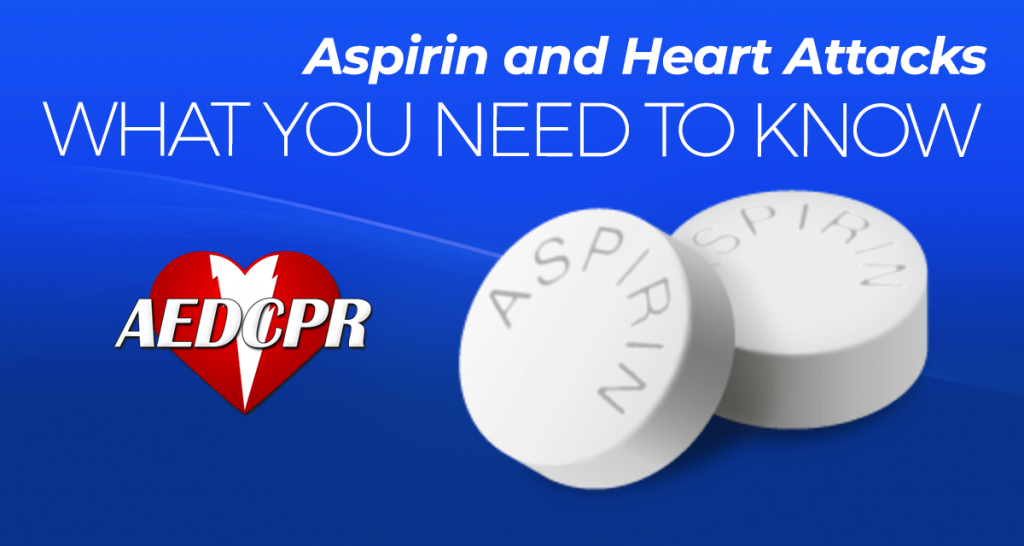
Aspirin and Heart Attacks | What You Need to Know
With a history that stretches as far back as the late 1800s, aspirin is one of the most studied drugs in the world, being part of an estimated 700-1000 clinical trials per-year. Originally for pain relief, its effects on cardiovascular health have been observed since the 1970s. But can
The answer is yes, it absolutely can provide relief for a heart attack while you await proper treatment. Taking an over-the-counter painkiller during a life
Should I take aspirin or call 911 first?
If you believe you’re having a heart attack, the first thing you should do is call 911. It’s important to remember that aspirin does not treat the cause of a heart attack by itself. Remember that there is no substitute for the help trained medical professionals can provide. The sooner you call 911, the sooner they can be there to help with live-saving equipment. After calling, then take the aspirin. If possible, you can take the aspirin while on the phone with the dispatcher.
How should I take the aspirin? And how much?
If you’re suffering from a heart attack, time is of the essence. Chewing or crushing the aspirin before swallowing it allows it to be absorbed into your bloodstream more quickly.
Doctors recommend most people take a regular, adult strength (350mg) uncoated tablet. Enteric-coated aspirin, sometimes called “safety-coated” resists dissolving and being absorbed into the stomach. This helps prevent stomach ulcers and associated bleeding, but it also means the aspirin takes longer to get to work.
Preventing Heart Attacks with Aspirin
Taking a low-dose (81mg) aspirin daily can help lower your risk of a heart attack, but according to the American Heart Association, it’s not for everyone. For many, the risks outweigh the benefits. Low-dose aspirin is not for those with no history of heart problems. Aspirin’s anti-clotting effect increases your risk
There is also some gray area when it comes to the topic of age and aspirin. According to the U.S Preventive Services Task Force, there is insufficient evidence to determine whether or not the potential benefits of aspirin outweigh the risks in adults younger than 50 or older than 70.
So who is it for? Doctors are more likely to recommend daily aspirin therapy to patients who are at high risk of heart attack. This includes patients who have:
- Already suffered at least one heart attack.
- Had a stent placed in a coronary artery.
- Undergone gastric bypass surgery.
- Experience chest pain due to coronary artery disease.
In short, who benefits from a low-dose aspirin regimen varies on a case-by-case basis. Your doctor will be able to determine if it’s the right treatment for you.
How can I tell if I’m having a heart attack?
Recognizing when you’re having a heart attack will increase your odds of getting treatment on time. The symptoms of a heart attack can vary on a case-by-case basis. They can be sudden, or develop gradually.
- Chest pain or discomfort is the most common symptom of a heart attack. It may feel like a squeezing sensation, tightness, pressure or an aching pain. The pain experienced during a heart attack being sharp and severe is actually a common misconception; in most cases, it’s more mild, so don’t ignore it. The pain is usually persistent, but in some cases has been known to temporarily subside after a few minutes: that does not mean the heart attack is over.
- Pain or discomfort in other areas of the upper body is also common. This includes one or both arms, the back, neck, jaw and stomach.
- Nausea, vomiting and lightheadedness occur in many cases.
- Fatigue or shortness of breath can be the result of your heart not pumping oxygen-rich blood effectively.
While chest pain or discomfort is the primary warning sign for a heart attack in both sexes, women are more likely than men to experience many of these additional symptoms.
Even if you aren’t certain that you’re experiencing a heart attack, it’s important to be proactive in seeking help and call 911 anyway. Don’t wait until it’s too late; a heart attack can lead to sudden cardiac arrest (SCA). If emergency medical services arrive before a patient goes into cardiac arrest due to ventricular fibrillation, that patient’s chance of survival goes up from 20% to 90%.
What do I do if someone in my household is at risk?
Provided they already have a healthy lifestyle and are seeing their doctor regularly, you can learn CPR. Taking a CPR course may help you recognize when someone else is having a heart attack, in addition to teaching you what to do to help them. To that end, you may want to consider purchasing an automated external defibrillator (AED) in the event of an emergency. Hopefully you’ll never need to use it, but it’s better to have it and not need it than to need it and not have it.
